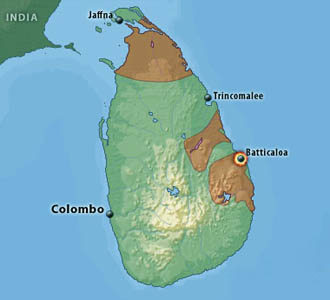Conflict over, but Tamil civilians languish in camps
 Colombo - Thirteen-year-old Sopika Surendranathan was injured in a December mortar attack during the conflict in northern Sri Lanka but remains in a camp meant for tens of thousands of displaced people.
Colombo - Thirteen-year-old Sopika Surendranathan was injured in a December mortar attack during the conflict in northern Sri Lanka but remains in a camp meant for tens of thousands of displaced people.
A lawyer retained on behalf of her family argued successfully before the Supreme Court last week for a medical examination of the girl because she was not getting the required medical attention in the camp.
Sopika's case is rare, however. Most of the 270,000 people displaced in the final months of the conflict, which ended in May with the government's defeat of the Tamil separatist rebels, lack the access to lawyers and the money to go to court to fight for their rights. Instead, they go through the rough conditions in the government-run camps.
Conditions there are less than ideal, with claims that they lack health and sanitation facilities, and the reunifications of families, even those living in the same camp, have yet to take place.
Residents are not being allowed to leave the camps, some of which are encircled by barbed wire, although their priority is to return to their villages and their livelihoods, such as farming and fishing.
The government said the move is "due to security reasons," indicating it could face threats although it gave no explanation as from whom the threats come after the government said it had crushed the rebels.
About 10,000 Tamil rebels, including some hardcore fighters, have surrendered to security forces or have been picked up during the screening process at the camps.
The government also defended its decision to continue to hold the refugees by saying their homelands need to be cleared of mines laid by both the rebels and government security forces during a 26-year conflict that killed more than 100,000 people.
"My problem is that we have to get the certificate of demining from the UN," President Mahinda Rajapaksa said in a recent newspaper interview.
However, not all of the displaced want to return to their devastated home villages. Some want to live with relatives in the south, move to traditional Tamil population centres in northern and eastern Sri Lanka or travel overseas to join relations there.
A Tamil politician who once campaigned against the Tamil rebels wrote a letter to Rajapaksa, criticizing how children and the elderly were being held back in the camps.
"What provoked me to write this to you today is the denial of the authorities to release a 1-year-old child with the 61-year-old grandmother," the leader of the Tamil United Liberation Front, V Anandasangaree, wrote.
He said the child's father was living in the north-east after having a leg amputated while the mother was living in a camp in another location in the north after also losing a leg.
"We are providing the best facilities we can and taking steps to release the elderly persons from the camps," Human Rights Minister Mahinda Samarasinghe countered.
His ministry said about 10,000 people over 65 were to be allowed to leave the camps, but Tamil civilians said they had yet to be informed of such a move.
Meanwhile, strict restrictions have been imposed on international and local nongovernmental organizations (NGOs) seeking to work in the camps, and news about camp conditions has also been limited because media access has been limited to selected reporters, such as those from the state-run media.
The government's reluctance to allow a free flow of aid workers to the camps came amid charges that some of these organizations were sympathetic toward the rebels.
Samarasinghe also defended the government's tightening of its visa policy for foreign NGO workers, saying, "They will have to justify their visits and approval will be given to them if the locals cannot do their job."
But the failure to obtain the full support of local and international NGOs has been having a negative impact on the people living in the camps.
"We feel that the people could be served better if the aid workers were given free access to the camps," said a representative of an international aid agency who asked not to be named.
The government has promised to resettle nearly 80 per cent of the displaced before the end of the year.
Hopes are alive that at least a majority of the camp residents would be able to return to their villages, but optimism does not reign for a political solution to the ethnic conflict, sparked in part by complaints by the Tamil ethnic minority of discrimination at the hands of the Sinhalese majority.
Rajapaksa himself has declared that a political solution could come only after the next presidential election. Rajapaksa constitutionally has the option of holding elections after November or delaying them for two years.
The campaign by the rebels for a separate state in northern and eastern Sri Lanka is over, but some of the causes of the struggle remain. (dpa)